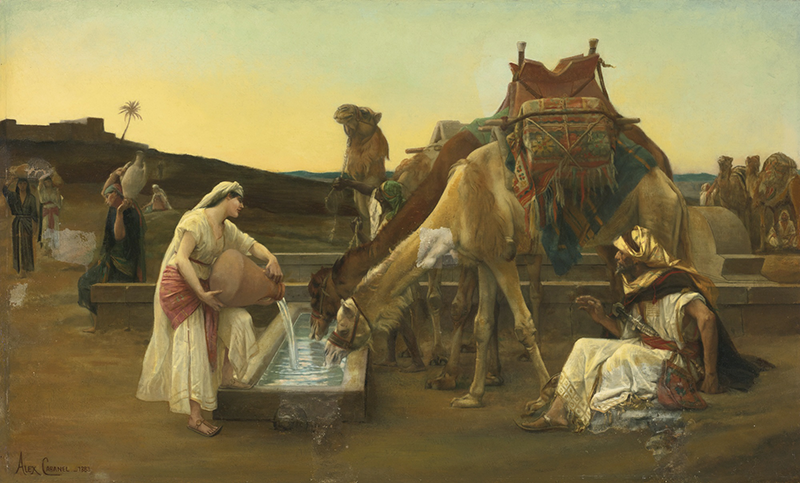Bonjour / Hello [nickname_else_first_name],
Table of contents
1) Perashat Hashavoua - Rabbi Eli Mansour
2) Halakhat Hashavoua (Halakhot related to day to day life) By Hazzan David Azerad -
The Parameters of the Mitzvah -Peninei Halacha
3) Holy Jokes!
4) For KIDS

This Week's Parasha Insight with Rabbi Eli Mansour
Parashat Hayeh-Sara- Heavenly Matches
Parashat Hayeh-Sara tells the story of Eliezer, Abraham Abinu’s trusted servant whom Abraham sent to find a wife for Yishak. Abraham made Eliezer take an oath that he would not bring for Yishak a woman from the local population, and would instead find a wife from Abraham’s homeland. In imposing this oath upon Eliezer, Abraham said, "I will make you swear by Hashem, G-d of the heavens and G-d of the earth" (24:3).
Rabbi Abraham Ibn Ezra (Spain, 1089-1167) explains why Abraham emphasized in this context that Hashem is "G-d of the heavens and G-d of the earth." He writes: "Because [the designation] of the daughter of so-and-so for so-and-so on earth is from the heavens." The matches that are made here on earth are decided up in the heavens, and so as Abraham sends his servant to find a spouse for his son, Yishak, he speaks of Hashem as "G-d of the heavens and G-d of the earth," emphasizing that the matches on earth originate in the heavens. Ibn Ezra concludes, "Ve’hu Sod" – "This is a secret," indicating that this interpretation touches upon profound Kabbalistic teaching.
Later commentators uncovered for us the deep concepts underlying Ibn Ezra’s remark. The Gemara in the beginning of Masechet Sota teaches that even before a fetus is formed, a heavenly voice declares whom that person is going to marry. However, the Gemara adds, this refers only to "Zivug Rishon" – "the first marriage." When it comes to "Zivug Sheni" – a person’s second marriage, this is not predetermined, and who a person marries the second time depends on his or her deeds. On the surface, the Gemara here speaks of people who marry more than once, due to the death of their spouse or divorce. The Kabbalists, however, explain this Gemara differently. They explain that a husband and wife’s souls were created together, bound into a single entity. Just as the Sages teach that Adam and Hava were created as a single body, and were then separated, similarly, a husband and wife’s souls began as a single soul in the heavens. They were then separated and sent down to the earth as two different beings, and so when a man and woman marry, their souls reunite and again become bound into the single soul that they had initially comprised. The Gemara thus teaches that the "Zivug Rishon" – the initial bond between a husband and wife, which existed in the heavens before they were born, is predetermined by G-d, and has nothing to do with their actions and their merits. But the "Zivug Sheni" – the reuniting of the two souls in this world through marriage, is not predetermined, and needs to be earned. Indeed, as we know, in order to find a spouse, one must develop his character, be responsible and prepare himself to build a close relationship and care for a family. The original bond between the two souls happens without any effort, but the "Zivug Sheni" here on earth requires a great deal of hard work.
On this basis, the Kabbalists explained the Gemara’s famous comment that making a match is "as difficult as the splitting of the Yam Suf." At first glance, the splitting of the sea – which involved separating water, which is naturally together – seems hardly an appropriate analogy for matchmaking, which involves the precise opposite process, bringing two different, distinct individuals together. In light of what we have seen, however, to the contrary – the splitting of the sea is the perfect analogy for matchmaking. The waters of the sea split to allow Beneh Yisrael to safely cross, and then came back together. The same is true of a husband and wife – the two souls begin bound together in the heavens, but are at one point separated, and reunited again through marriage.
This, then, is the deeper meaning of the Ibn Ezra’s remark: "Because [the designation] of the daughter of so-and-so for so-and-so on earth is from the heavens." The Ibn Ezra is not simply saying that G-d determines in the heavens whom a person marries here on earth. Rather, he is subtly revealing to us the "secret" of matches – that they are literally "made in heaven," as the husband and wife were once a single soul in the heavens. The process of finding a mate involves finding the "missing" portion of one’s soul so they can be reunited, thereby allowing each individual to become the complete being that he or she was created to become.

Halachot this week are selected and Translated by Hazzan David Azerad
The Parameters of the Mitzvah -Peninei Halacha
There are two mitzvot about the Shabbat meal. One is oneg, the mitzvah to delight in Shabbat, as it is written: “Call Shabbat ‘delight’ (oneg)” (Yeshayahu 58:13). Oneg is fulfilled primarily through the meals, but snacks and a Shabbat nap are parts of it as well. The second mitzvah is to partake of three meals. The Sages saw this hinted at in various verses (Shabbat 117b).
The first meal is held on Friday night, the second on Shabbat morning before midday, and the third on Shabbat afternoon from half a seasonal hour after midday until shki’a. If one eats the third meal before this, he has not fulfilled his obligation (SA 291:2). One who did not eat dinner on Friday night should eat three meals on Shabbat day. If one cannot eat the second meal before midday, he should eat two meals afterward, for some maintain that the timing of the meals is not critical, and be-di’avad one may rely upon them (Behag; Rema 291:1).
Bread is the staple of the meal because it is the most important food. It is a mitzvah to prepare other good foods that people delight in. In the time of the Sages, people enjoyed a dish made of spinach, large fish, and heads of garlic, so it was a mitzva to prepare these for Shabbat (Shabbat 118b; MB 242:1). Since most people enjoy meat, wine, and delicacies (meaning tasty fruits), poskim write that we should have plenty of them (SA 250:2). One who does not enjoy meat and wine should prepare foods he does enjoy for Shabbat.
The Aĥaronim writes, based on Kabbala, that there is a mitzvah to eat fish at each of the three meals. Several reasons are given for this: fish symbolize blessing, they hint at deep matters since they are creatures of the deep, and ayin ha-ra (the evil eye) has no power over them. However, one who does not enjoy fish is not required to eat it (MA 242:1).
Even though eating sparingly is generally a positive character trait, on Shabbat it is a mitzvah to eat heartily. It is not considered gluttonous since it is for a mitzvah (Shabbat 117b; SA 274:2; MB 6). However, one should not overeat, because overeating leads to exhaustion and depression. As for those who stuff themselves, fill up, become tired, fall asleep, and do not study Torah, they do not get any credit for the mitzvah. They are not making Shabbat enjoyable, they are only pleasing their gullets (Shlah, Masekhet Shabbat, Ner Mitzva §37; see above 5:3).
One may not fast on Shabbat, even for just an hour. Even one who does not intend to fast but has not eaten anything by midday on Shabbat morning has transgressed this prohibition (SA and Rema 288:1). He also is not eating the second meal at its ideal time.
One who is ill and has no appetite need not eat very much, since the eating is meant to be pleasurable. One who does not enjoy eating need not eat much but should try to eat a little more than a kabetza (egg’s bulk) of bread. If even this is difficult for him, he should eat at least kabetza. If even this amount pains him, he should not eat at all (SA 288:2; 291:1).
Bevirkat Shabbat Shalom Umevorach
David Azerad
3) HOLY JoKeS!!
Selection of funny snippets, loosely related to this weeks parashah or current events, to brighten your day



4) FOR KIDS
Click on the image to open the youtube video














